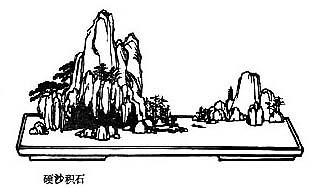Sun Zi 
 – L'Art de la guerre
– L'Art de la guerre
La stratégie chinoise ou comment s'informer, estimer, diviser, détourner, tromper, et vaincre « sans coup férir ». Tr. Amiot (fr) et Giles (en).
De la distribution des moyens
Sunzi IX. 2.
II. Si vous êtes auprès de quelque rivière, approchez-vous le plus que vous pourrez de sa source ; tâchez d'en connaître tous les bas-fonds et tous les endroits qu'on peut passer à gué. Si vous avez à la passer, ne le faites jamais en présence de l'ennemi ; mais si les ennemis, plus hardis, ou moins prudents que vous, veulent en hasarder le passage, ne les attaquez point que la moitié de leurs gens ne soit de l'autre côté ; vous combattrez alors avec tout l'avantage de deux contre un. Près des rivières mêmes tenez toujours les hauteurs, afin de pouvoir découvrir au loin ; n'attendez pas l'ennemi près des bords, n'allez pas au-devant de lui ; soyez toujours sur vos gardes de peur qu'étant surpris vous n'ayez pas un lieu pour vous retirer en cas de malheur.
Amiot
After crossing a river, you should get far away from it.1
When an invading force crosses a river in its onward march, do not advance to meet it in mid-stream. It will be best to let half the army get across, and then deliver your attack.2
If you are anxious to fight, you should not go to meet the invader near a river which he has to cross.3
Moor your craft higher up than the enemy, and facing the sun.4 Do not move up-stream to meet the enemy.5 So much for river warfare.
Giles IX.3-6.

L'Art de la guerre – Sun Zi IX. 2. – Chinois off/on – Français/English
Alias Sun Tzu, Sun Wu, Sun Tse, Sunzi Bingfa, Souen Tseu, Souen Wou, 孫武.
Le Canon des Poèmes, Les Entretiens, La Grande Étude, Le Juste Milieu, Les Trois Caractères, Le Livre des Mutations, De la Voie et la Vertu, 300 poèmes Tang, L'Art de la guerre, Trente-six stratagèmes
Bienvenue, aide, notes, introduction, table.
Index – Contact – Haut de page
